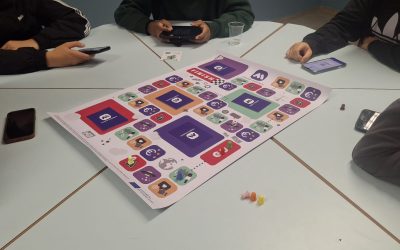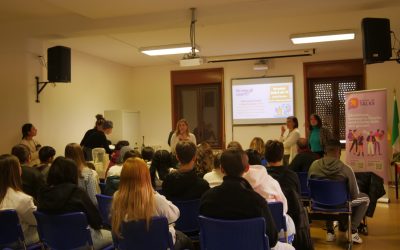Today 20 November marks World Children’s Day, an important moment to reflect on how our societies protect and promote the rights of children and adolescents. It is a reminder that safeguarding their rights is not only a legal obligation, but a collective responsibility that requires coordination, preparation, and a strong community of support.
Across Europe, volunteer guardians play a crucial role in ensuring that unaccompanied children have access to education, healthcare, housing, and emotional support. As part of the GUIDE project, we have recently conducted national assessments to better understand how guardianship is organised and evolving in each partner country, thus highlighting practices that work well and identifying opportunities to strengthen the support available to both guardians and young people.
Effective guardianship relies on coordinated action
With Law 47/2017, Italy created the role of the volunteer guardian, thus building a guardianship framework that recognises their social value, with the development of training programmes, local networks, and community-based forms of support.
The assessment report shows that Italy’s guardianship system is supported by committed actors and established structures, while also revealing areas where coordination and support could be strengthened to improve availability, accessibility, and quality of support.
Guardians described how their work increasingly involves responding to diverse and sometimes complex needs – from navigating different cultural backgrounds to accompanying young people with multiple vulnerabilities. The compulsory training programmes provide guardians with an essential foundation, but they also need ongoing, adaptive training that reflects the evolving realities of their role.
Young people offered an equally important perspective. They often have only a limited understanding of who their guardian is or how they would be involved in key decisions. This points to the importance of clear, accessible communication at the outset of the guardianship relationship, ensuring that young people feel informed and actively engaged in their own pathway.
Coordination also emerges as a central element within the guardian community itself. Over time, guardians have developed informal ways of supporting one another – small groups, messaging chats, and regular exchanges that help them navigate uncertainties and share practical knowledge. These interactions show how much of the system’s strength already lies in peer support and collective experience.
When viewed across the broader ecosystem, the importance of coordination becomes even more evident. The journey of an unaccompanied child involves multiple institutions – support services, reception centres, schools, social workers, courts, local authorities, cultural mediators – all of which must work in a coherent, connected way, to offer young people continuity and stability. Strengthening these links is therefore essential to ensuring that support remains consistent, timely, and aligned with the needs of each young person.
The GUIDE campaign: supporting those who protect, safeguarding those who grow
All these insights provided the inspiration for the new GUIDE campaign, launched today to mark World Children’s Day. The campaign is built around a simple idea: guardianship is a collective commitment, and the protection of unaccompanied children depends on the strength of the networks that surround them.
It aims to recognise the role of volunteer guardians as part of a broad, interconnected system, one that includes institutions, local authorities, civil society organisations, schools, and local services.
The campaign promotes concrete tools and resources to encourage cooperation, reflect shared experiences, and help spread practices that can strengthen the guardianship system in a sustainable, community-oriented way.
Looking ahead with commitment and collaboration
This year, World Children’s Day reminds us that protection is not the responsibility of a single actor, but a collective effort built across systems, territories, and professional and volunteer communities.
Building a cohesive network is essential: when dialogue is continuous, cooperation is genuine, and investment is made in ongoing training and the valorisation of frontline experience, guardianship becomes more effective, more attentive, and more aligned with the needs of children. Creating strong connections among all actors means building bridges – and contributing, together, to a system that places the wellbeing of the young people who pass through our country at its centre.
Monica Palazzo, lawyer and social worker, explains further the role of the volunteer guardian:
About the project
GUIDE – Supporting Guardians of Unaccompanied Children is a project funded by AMIF-2023-TF2-AG-CALL-06-CHILDREN; AMIF Action Grant Budget-Based.
Partners
- EUROPEAN ASSOCIATION OF SERVICE PROVIDERS FOR PE (Belgium, coordinator)
- EUROCHILD (Belgium)
- IASIS (Greece)
- SDRUZHENIE NATSIONALNA MREZHA ZA DETSATA (Bulgaria)
- Imago Foundation (Poland)
- Fundacja Save the Children International (Poland)
- TENENET OZ (Slovacchia)
- CESIE (Italy)
- DIMOS EGALEO (Greece, associated partner)
- Save the Children Europe (Belgium, associated partner)
- SAVE THE CHILDREN ITALIA ONLUS ASSOCIAZIONE (Italy, associated partner)
- Europsky institut regionalneho rozvoja, n.o. (Slovacchia, associated partner)
- TRNAVSKA UNIVERZITA V TRNAVE (Slovacchia, associated partner)
For further information
Read more about the project. Contact Fabiana Adamo: fabiana.adamo@cesie.org.









